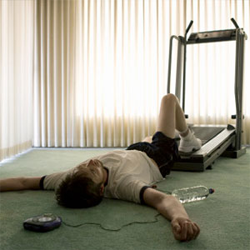How to Exercise Safely with Hypothyroidism
Written by Tom Brimeyer | Posted in Exercise | 8 Comments
 Generally speaking, people don’t do well with moderation and complacency. Instead, people tend to have this obsession with extremes. We tend to live with a “more is better” type of mindset today.
Generally speaking, people don’t do well with moderation and complacency. Instead, people tend to have this obsession with extremes. We tend to live with a “more is better” type of mindset today.
People want to drive the fastest cars even though they are stuck driving 45 mph to work every day (72 kph for those of you on the metric system). People will spend twice as much for a TV that has a measly inch of extra viewing screen (2.54 centimeters). And in a similar fashion, people tend to want to exercise to the extreme as well.
Why?
Because people believe that if exercise is healthy then more exercise must be healthier, right?
Unfortunately, that’s not the way it works.
Nobody questions the fact that eating every day is necessary for health, but overeating is unhealthy.
So, why would exercise be any different?
Before you jump into your next Zumba class or set your sights on your next treadmill, first understand that exercise is a stress to your body. The longer and the harder you exercise, the bigger of a stress it becomes.
When you exercise, you are effectively forcing your cells to produce more energy and produce that energy faster. This means that you’re burning through more fuel and you’re burning through it faster as well. We already know that hypothyroidism sufferers don’t store fuel properly, which makes you even more susceptible to the stress of exercise.
Instead of relying on stored fuel during exercise to keep your cells happy, your body has to start pulling fuel from your bloodstream, which ultimately leads to low blood sugar. Forcing your body into a stress response due to low blood sugar is one of the many ways that exercise impairs thyroid function.
Of course that’s just a simplified overview of just one of the many ways in which exercise inhibits your thyroid. But it’s a big and very common one. And most people don’t even realize what they are doing to themselves.
Below we’ll look at 3 simple tips that you can use to help make exercise safe for your thyroid, including how to monitor your body’s response to exercise to ensure that it is safe.
1. Avoid Cardio, Aerobics, Intense, and Other Breathless Forms of Exercise
It should make perfect sense that if you don’t want exercise to be a stress on your body and thyroid, then you have to stop the stress response before it happens.
When you do cardio, aerobics, or any other intense form of exercise where your body is not able to immediately meet the energy demands of the exercise, you are effectively causing a stress response in your body. When you become breathless, or find it difficult to catch your breath during exercise, this is a sign that your body doesn’t have enough oxygen available to support healthy energy production. Instead your body begins to compensate by shutting down your thyroid.
This is most common among those who do cardio or endurance forms of exercise that require sustained periods of energy production. And there are numerous studies that demonstrate the elevated stress hormone levels associated with this sort of endurance exercise…
Elevated hair cortisol concentrations in endurance athletes.
http://www.ncbi.nlm.nih.gov/pubmed/21944954
“These data suggest that repeated physical stress of intensive training and competitive races among endurance athletes is associated with elevated cortisol exposure over prolonged periods of time. These findings may have important implications with regard to somatic and mental health of athletes which should be investigated in future research.”
Salivary hormone and immune responses to three resistance exercise schemes in elite female athletes.
http://www.ncbi.nlm.nih.gov/pubmed/21572351
“Postexercise C (Cortisol) concentrations increased after all schemes, compared to control values (p < 0.05). In the SHS, the postexercise C response was also greater than pre-exercise data (p < 0.05). The current findings confirm that high-volume resistance exercise schemes can stimulate greater C (Cortisol) secretion because of higher metabolic demand.”
The results of these studies are not limited to athletes alone. In fact, if you are hypothyroid then it can take very little exercise to induce the very same stress response.
If we know that stress hormones suppress thyroid function and that cardio, endurance, or other breathless types of exercise increase stress hormone production, then it should make sense that these types of exercise are not conducive to healing your thyroid or improving your metabolism.
There are far more benefits to exercise than just burning calories or a way to lose weight. But to really take advantage of those benefits, you can’t overexert yourself.
Instead, take it easy and stop focusing on killing yourself in the gym. When you try to kill yourself in the gym, you literally are killing yourself. Generally speaking, when it comes to exercising with hypothyroidism, less is more.
2. Focus On Nutrition and Blood Sugar Regulation
Now that you understand that something as simple as low blood sugar, induced by exercise, is enough to suppress your thyroid, it should also make sense that properly regulating your blood sugar is an integral part of offsetting the stress response of exercise.
A good place to start is by simply making sure that you’ve eaten something before exercising. Exercising on an empty stomach, especially first thing in the morning, is one of the fastest ways to elevate stress hormones and damage your thyroid.
3. Monitoring Your Temperature and Pulse
I talk a lot about monitoring your temperature and pulse as an indicator of thyroid function and metabolism. You probably don’t realize that you can also use it to your advantage in measuring your body’s respond to exercise as well.
 If you simply record your temperature and pulse before your workout, and then again 30 to 45 minutes (at rest) after your workout, you can tell you a lot about whether or not your workout was productive, or if it was counterproductive.
If you simply record your temperature and pulse before your workout, and then again 30 to 45 minutes (at rest) after your workout, you can tell you a lot about whether or not your workout was productive, or if it was counterproductive.
If your post-workout temperature drops after your body returns to its rested state, this is a telltale sign that your thyroid has been negatively affected. But you also need to account for other signs like fatigue, cold extremities, etc. This ultimately means that you need to go back to the drawing board and make some changes to your nutrition and exercise plan.
Sure, people love to step on the scale everyday as a way of measuring their results. But a positive shift in your scale is not an accurate indicator of a positive shift in your health. In fact, it can mean quite the opposite. So, instead of stepping on your scale, you should really be measuring your temperature and pulse. Those are far more accurate indicators of your state of health.
A lot of the issues associated with exercise today are really caused by our lack of knowledge and understanding of exercise and how it affects our physiology. So, instead of making the mistake of assuming that all exercise is healthy, and that the more you exercise the better, start monitoring your temperature and pulse and see for yourself if your exercise is really serving you and your thyroid well.
Instead of killing yourself in the gym, listen to your body and stop exercising when you become fatigued or your performance decreases. That really is your body’s way of telling you something.
And simply use some common sense. Exercise is not a proper means of relieving stress. As I’ve explained, it promotes stress. So, if you’re feeling stressed on a particular day, exercise is probably the last thing that your thyroid and body needs.












Janet Addison
26. May, 2013
Hi,
I’m actually HypERthyroid. Does any of this apply to me?
I have Graves Disease.
Regards
Tom Brimeyer
28. May, 2013
Yes, it would still apply.
neeters
25. Jul, 2013
boy wish I had know this before I almost killed myself by doing high intensity cardio intervals and turbo fire aerobics everyday to fight the peri menopausal paunch. yes, I did lose weight fast at first, but then I started getting tired, stopped sweating ,pushed myself to work out even harder, and then declined rapidly,, became freezing cold after workouts, and then eventually freezing cold all the time.Extreme fatigue set in.I suffered adrenal dysfunction and low thyroid symptoms bad enough to force me to go on disability. for 18 months I didn’t have enough energy to shower and dress on a daily basis. lost tons of hair and eyebrows and then gained 35 lbs in just 5 months. Long story short, took almost 2 years of begging doctors to help. lab tests normal. Is this normal. NO. but what I had done to my body wasn’t normal. with the help of a good Naturopath, gluten free diet, lots of rest, good adaptogens at first,and eventually thyroid replacement, I am happy to say I’m back at work and starting to feel stronger. but I now know you have to REST. and ya don’t need to kill yourself at the gym. I just go on walks when I feel I can, otherwise I just control my eating. I learned the hard way that pushing yourself too hard at the gym has very serious consequences.
Kim
27. Aug, 2013
I like to run, and I seem to do well during the cold months of the year. But when it starts to get warmer, I get overheated easily and running is not positive thing for me. Going out for a run can set me back a week in terms of fatigue and over-all body pain, etc.
Is this normal? What is the connection between heat (specifically hot weather) and increased symptoms?
Tom Brimeyer
09. Sep, 2013
Hi Kim,
Yes, this is normal with hypothyroidism.
julie
07. Nov, 2013
I have had several blood test done and the only thing that is high is my RDW and I dont absorb nutrients .My symptoms are fatigue,cold all the time, shortness of breath, sleepless nights and the list goes on. I thought I was eating great now I am not sure what to eat. I am a runner about 25 miles a week and Iam 46 . I am stumped on what is going on any suggestions?
Tom Brimeyer
08. Nov, 2013
You have some very common and telltale signs of hypothyroidism. Unfortunately you can’t rely on TSH testing as both research and symptomatic treatment show that TSH should be close to 1 or below. So the reference ranges that doctors use are very off. We also use temperature and pulse to monitor thyroid function more accurately. For anyone with hypothyroidism, breathless exercise, such as running, is very counterproductive for metabolism and healing. We are trying to restore oxidative metabolism so that your cells can actually metabolize thyroid hormone properly.
anne whitlock
17. Jun, 2014
Will this help hypothyroid if you take synthroid and had your thyroid radiated about 15 years ago.